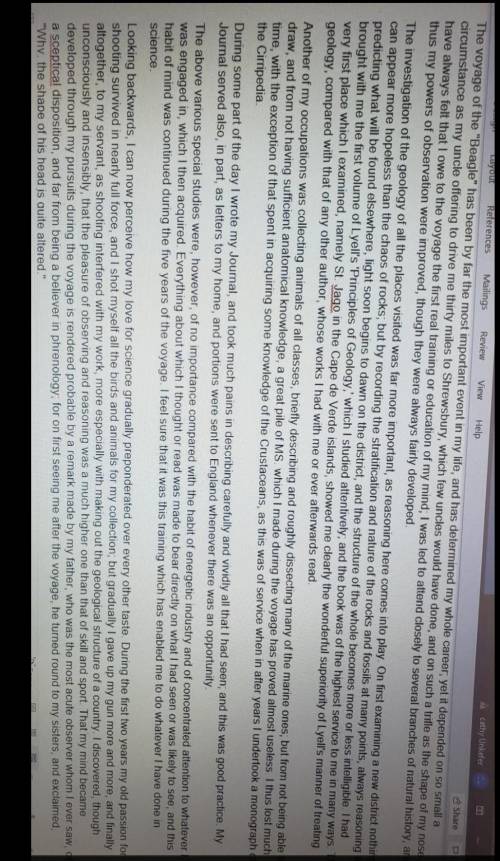
English, 14.10.2021 22:00 1tallison1
Read the passage. "The Autobiography of Charles Darwin" by Charles Darwin. Excerpt from Voyage of the Beagle from December 27, 1831, to October 2, 1836. ( Question 1: Which paragraphs from "The Autobiography of Charles Darwin most effectively develop Darwin's claim that the voyage of the "Beagle" was the most important event in his life? Use evidence from the text to support your response. Needs to be two or three complete paragraphs. ( Please don't repost anyone else's answers that are on her or any other websites). Will Mark Brainliest if correct. ( Please Read Right Her What Is Written Down And Please Reword This To Make It Sound The Same But In Rewording). - Read Now -> (Charles Darwin set sail on the ship HMS Beagle on December 27, 1831, from Plymouth, England. Darwin was twenty-two years old when he was hired to be the ship's naturalist. Most of the trip was spent sailing around South America. There Darwin spent considerable time ashore collecting plants and animals. Darwin filled notebooks with his observations of plants, animals, and geology. The trip was an almost five-year adventure and the ship returned to Falmouth England, on October 2, 1836. Throughout South America, Darwin collected a variety of bird specimens. One key observation Darwin made occurred while he was studying the specimens from the Galapagos, Islands. He noticed the finches on the Island were similar to," the finches from the mainland, but each showed certain characteristics that helped them to gather food more easily in their specific habitat. He collected many specimens of the finches on the Galapagos, Island. These specimens and his observations as he developed the theory of evolution through natural selection). Will Mark Brainliest .


Answers: 1


Another question on English

English, 21.06.2019 23:30
4. at the conclusion of frankenstein, robert walton has an encounter with the monster, who arrives after victor frankenstein has died. perhaps surprisingly, the monster mourns his creator and expresses remorse over the fate that victor suffered. the monster pledges to destroy himself and then departs, disappearing as he goes further north. how does the monster’s behavior and attitude in this part of the novel affect the way readers view him? is he sympathetic? is he more hateful because it is only after victor has died that he relents? how does the change in the monster fit with the theme of duality in the novel?
Answers: 1

English, 22.06.2019 02:30
Edgar allan poe uses many sound devices in his poem "the bells." which two words from the poem are examples of onomatopoeia?
Answers: 1

English, 22.06.2019 07:20
Which of the following best describes how the majority of content decisions are made by the media?
Answers: 3

English, 22.06.2019 20:30
Ok, so im doing a t.d.q that has to be done on a.c.e, on the story of my life by helen keller and i need ! this is due tomorrow and if i don't turn it in it will affect my grade.
Answers: 1
You know the right answer?
Read the passage. "The Autobiography of Charles Darwin" by Charles Darwin. Excerpt from Voyage of th...
Questions


Biology, 12.10.2021 07:50


Mathematics, 12.10.2021 07:50







English, 12.10.2021 07:50


Mathematics, 12.10.2021 07:50

Biology, 12.10.2021 07:50


Mathematics, 12.10.2021 07:50

Chemistry, 12.10.2021 07:50


English, 12.10.2021 07:50

Mathematics, 12.10.2021 07:50



